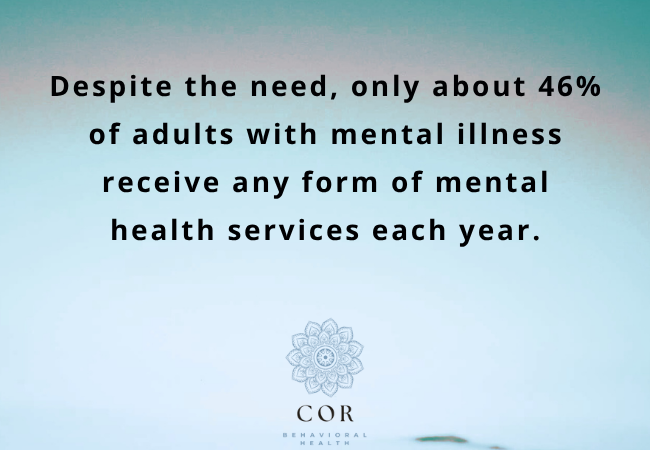
Healing from trauma isn’t just about treating symptoms. It’s about creating an environment where individuals feel safe, seen, and supported—where their experiences are honored, not questioned. That’s the foundation of trauma-informed care.
At COR Behavioral Health, we understand that trauma affects not only the mind, but the body, nervous system, relationships, and sense of self. That’s why our entire team is committed to providing trauma-informed mental health treatments in Martin County, Florida—whether you’re seeking therapy for depression, anxiety, PTSD, or co-occurring substance use.
In this blog, we explore what trauma-informed care really means, why it’s essential, and how it transforms the path to recovery.
What Is Trauma-Informed Care?
Trauma-informed care (TIC) is a framework that recognizes the widespread impact of trauma and understands how it shapes thoughts, emotions, and behaviors. Instead of asking, “What’s wrong with you?” TIC asks, “What happened to you?”
At its core, trauma-informed care:
- Prioritizes physical and emotional safety
- Builds trust between providers and clients
- Empowers individuals through choice and collaboration
- Acknowledges the prevalence of trauma in all populations
- Integrates knowledge of trauma into all levels of treatment
Every member of a trauma-informed care team—from therapists to support staff—operates with empathy, patience, and an understanding of trauma’s effects.
Why Trauma-Informed Care Matters in Mental Health Treatment
1. Trauma Is More Common Than You Think
- Around 70% of U.S. adults have experienced at least one traumatic event in their lifetime.
- 1 in 6 adults experienced four or more adverse childhood experiences (ACEs).
- Trauma can result from violence, abuse, neglect, grief, accidents, illness, discrimination, and more.
Source: National Council for Mental Wellbeing / CDC
Because trauma is so prevalent, it’s essential that all treatment be approached through a trauma-informed lens, even when trauma isn’t the primary reason for care.
2. Trauma Can Be the Root of Other Mental Health Conditions
Many people seek care for depression, anxiety, bipolar disorder, or substance use—but these symptoms often have underlying trauma that hasn’t been addressed.
At COR Behavioral Health, we integrate trauma treatment in Martin County, Florida with other services such as:
- Anxiety treatment in Martin County, Florida
- Depression treatment in Martin County, Florida
- Bipolar treatment in Martin County, Florida
- Dual diagnosis care through our Addiction and Mental Health Treatment Center in Martin County, Florida
When trauma is ignored, people may feel stuck in cycles of relapse or emotional shutdown—even with traditional therapy or medication. Trauma-informed care breaks that cycle.
3. Trauma Affects the Brain and Body
Trauma changes brain function and nervous system activity. People may:
- Become easily startled or overwhelmed
- Struggle to focus or sleep
- Feel emotionally numb
- Avoid people or situations that trigger memories
- React intensely to seemingly minor stressors
Trauma-informed care respects these responses as survival mechanisms, not character flaws. Our clinicians are trained to work with the nervous system, not against it.
Key Principles of Trauma-Informed Care at COR Behavioral Health
We don’t just offer trauma therapy—we weave trauma awareness into every service we provide. Our model follows the Six Core Principles of Trauma-Informed Care established by SAMHSA:
1. Safety
We prioritize emotional and physical safety across all programs—from individual therapy in Martin County, Florida to PHP and IOP.
2. Trustworthiness and Transparency
We clearly explain treatment plans, respect client boundaries, and create predictable routines.
3. Peer Support
Group therapy in Martin County, Florida helps reduce isolation, build trust, and create shared understanding.
4. Collaboration and Mutuality
We view each client as the expert in their own experience, partnering with them in their healing process.
5. Empowerment, Voice, and Choice
Clients guide their pace and participation, and we celebrate their strengths—not just their struggles.
6. Cultural, Historical, and Gender Awareness
We deliver care that is inclusive, identity-affirming, and respectful of cultural differences.
How Trauma-Informed Care Shapes Treatment at Every Level
Individual Therapy
In individual therapy in Martin County, Florida, we build trust before diving into traumatic memories. Therapists use techniques like:
- CBT (Cognitive Behavioral Therapy)
- DBT (Dialectical Behavior Therapy)
- EMDR (Eye Movement Desensitization and Reprocessing)
- Somatic and mindfulness-based approaches
We move at the client’s pace and prioritize emotional safety over speed.
Group Therapy
Group sessions are carefully facilitated with trauma sensitivity in mind. We:
- Establish group norms that foster respect and confidentiality
- Encourage sharing, but never require it
- Focus on building connection, coping skills, and emotional regulation
Medication Management
Trauma symptoms often overlap with anxiety or mood disorders. Our trauma-informed psychiatric providers work with clients to find medications that reduce distress without overmedicating or ignoring root causes.
Partial Hospitalization and Intensive Outpatient Programs
Our Partial Hospitalization Program (PHP) and Intensive Outpatient Program in Martin County, Florida provide structured, daily support in a trauma-informed environment. These programs:
- Offer individual and group therapy
- Include medication and wellness planning
- Help clients stabilize, process trauma, and practice recovery tools
- Foster community while protecting personal autonomy
What Makes Trauma-Informed Care Different From Traditional Treatment?
| Traditional Care | Trauma-Informed Care |
|---|---|
| Focuses only on diagnosis and symptoms | Considers full life context and history |
| May inadvertently re-trigger trauma | Actively works to avoid re-traumatization |
| Assumes resistance is noncompliance | Understands resistance as a trauma response |
| Views provider as expert | Views client and provider as partners |
| Emphasizes symptom control | Emphasizes healing, empowerment, and growth |
The Long-Term Benefits of Trauma-Informed Care
Trauma-informed care isn’t just about short-term stabilization. It helps individuals achieve:
-
Improved emotional regulation
-
Stronger interpersonal relationships
-
Increased trust in the therapeutic process
-
Enhanced self-awareness and self-compassion
-
Better long-term mental health outcomes
These benefits unfold over time, especially when clients participate in a consistent care plan that may include individual therapy, group therapy, and PHP or IOP support in Martin County, Florida.

Trauma-Informed Care and Physical Health
Trauma affects more than the mind—it also takes a toll on the body. Research links unresolved trauma to:
-
Chronic pain
-
Digestive disorders
-
Heart disease and hypertension
-
Autoimmune conditions
-
Fatigue, insomnia, and inflammation
By addressing trauma in a holistic way, clients may notice not just emotional relief—but physical improvements as well. At COR Behavioral Health, we take a mind-body approach to trauma healing.
Creating a Trauma-Informed Environment at COR Behavioral Health
From your first phone call to your last session, COR Behavioral Health is designed to support safety and healing. Here’s what that looks like in practice:
-
Warm, welcoming spaces free from judgment or pressure
-
Trained staff who recognize trauma cues and respond with empathy
-
Flexible treatment planning with client voice and consent prioritized
-
Clear communication at every stage of care
-
Ongoing feedback loops so clients help shape their healing journey
This culture of care ensures that healing begins the moment you reach out.
Trauma-Informed Support for Families and Loved Ones
Trauma impacts families, not just individuals. That’s why we offer:
-
Family therapy sessions to improve communication and rebuild trust
-
Education on trauma’s effects, so loved ones can better support recovery
-
Support groups for spouses, parents, or adult children
When families are included and empowered, healing becomes more sustainable.
Trauma-Informed Care for Addiction Recovery
At COR Behavioral Health, many clients enter treatment with both trauma and substance use. Our trauma-informed care addresses the deep-rooted pain that often drives addiction.
-
We don’t ask “Why the addiction?”—we ask “Why the pain?”
-
Our Addiction and Mental Health Treatment Center in Martin County, Florida offers dual diagnosis support with a trauma-informed foundation.
-
We avoid re-traumatizing language, promote autonomy, and help clients heal the trauma beneath the substance use.
Who Can Benefit From Trauma-Informed Care?
Trauma-informed care isn’t just for those with PTSD. It’s ideal for anyone who has:
- Survived abuse, neglect, or loss
- Experienced medical trauma or accidents
- Lived through discrimination, war, or systemic oppression
- Had a difficult or unpredictable childhood
- Been impacted by domestic violence or sexual assault
It’s also especially beneficial for individuals in early recovery from addiction, those with co-occurring disorders, and clients who’ve had negative past treatment experiences.
Why COR Behavioral Health?
We’re more than a treatment center—we’re a trauma-informed community dedicated to helping people heal with dignity, respect, and care.
- Licensed, trauma-trained clinicians
- Safe, empowering environment
- Custom care plans for trauma and co-occurring conditions
- Full continuum of care: outpatient, IOP, and PHP
- Local support in Martin County, Florida
Conclusion
If trauma has shaped your world in ways that feel invisible, overwhelming, or misunderstood—you deserve better than basic care. You deserve trauma-informed care.
At COR Behavioral Health, we honor your experience, support your strengths, and walk beside you with compassion. Call us today at 888.231.7973 to explore our trauma treatment in Martin County, Florida and take the first courageous step toward a safer, more empowered future.
Frequently Asked Questions (FAQs)
What is trauma-informed care?
Trauma-informed care is an approach to treatment that recognizes the widespread impact of trauma and prioritizes safety, trust, and empowerment throughout the healing process.
How is trauma-informed care different from traditional therapy?
Traditional therapy often focuses solely on symptoms. Trauma-informed care considers the client’s full history and ensures treatment does not retraumatize. It emphasizes partnership, safety, and sensitivity to emotional triggers.
Who benefits from trauma-informed care?
Anyone who has experienced trauma, including abuse, loss, medical emergencies, discrimination, or chronic stress. It’s also ideal for those dealing with anxiety, depression, PTSD, or substance use disorders.
What mental health treatments at COR Behavioral Health are trauma-informed?
All our services—including individual therapy, group therapy, PHP, and IOP in Martin County, Florida—are trauma-informed. This includes therapy for anxiety, depression, bipolar disorder, and dual diagnosis support.
Will I be forced to talk about my trauma?
No. Trauma-informed care is always client-paced. You will never be pressured to discuss anything you’re not ready to. We focus on helping you feel safe, grounded, and in control.
Do you offer trauma-informed care for addiction recovery?
Yes. Our Addiction and Mental Health Treatment Center in Martin County, Florida offers fully integrated trauma-informed care for individuals recovering from substance use and co-occurring disorders.



